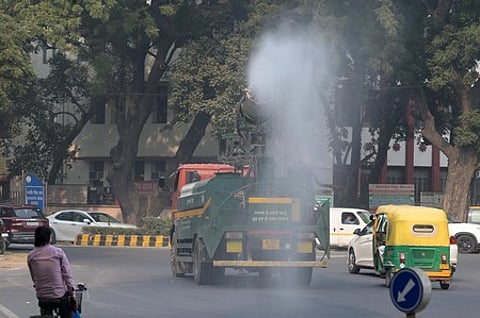

NEW DELHI: The Central Pollution Control Board has said the feasibility of cloud seeding as an emergency measure to battle winter pollution in northern India will be limited, citing insufficient moisture and reliance on pre-existing clouds, an RTI query has revealed.
The CPCB shared its observations on a cloud seeding proposal by IIT Kanpur, which aims to combat Delhi's severe air pollution crisis through artificial rainfall.
The information was shared in response to a Right to Information query filed by activist Amit Gupta on October 24.
According to the CPCB, cloud seeding faces significant challenges due to insufficient moisture in the air and the dependency on pre-existing clouds influenced by Western Disturbances.
"As per IIT Kanpur (proponent), the mandatory requirement of successful cloud seeding is the availability of appropriate clouds with enough moisture content (clouds having 50 per cent or higher moisture content). In northern India, winter clouds are often influenced by Western Disturbances, and the moisture content in the air remains low, limiting the scope of successful operations," the CPCB stated in its reply.
The board's comment comes against the backdrop of the Delhi government seeking emergency measures to combat a sharp rise in the city's pollution.
Reportedly, Delhi Environment Minister Gopal Rai has written to his Union counterpart Bhupender Yadav four times, urging the Centre to consider cloud seeding as a potential solution and convene a meeting on the matter.
Meanwhile, CPCB said the estimated cost of the proposed experiment will be approximately Rs 3 crore.
The proposal includes a minimum coverage area of 100 sqkm and involves five sorties (cloud seeding attempts).
As part of the proposal, a presentation was made by Dr Manindra Agrawal and his team from IIT Kanpur to the Delhi government on November 8, 2023.
The presentation outlined the involvement of 12 key agencies, including Defence, Home, and Environment.
IIT Kanpur conducted cloud seeding trials during the summer of 2017, reportedly achieving successful precipitation in six out of seven attempts.
The trials primarily aimed at developing a cost-effective strategy for cloud seeding by optimising both seeding agents and flying platforms.
While the experiments resulted in successful precipitation, the type and intensity of rainfall remained difficult to control.
The proposed trials in Delhi aim to build on the findings of those trials.
A recent report said that light-intensity rains (2.5-15.5 mm) in Delhi on three days in November last year brought the PM2.5 concentrations from 315 micrograms per cubic metre air to 95 micrograms per cubic metre air during the period.
PM10 levels too reduced from 501 micrograms per cubic metre air to 167 micrograms per cubic metre air over the same period.
All the same, the cloud seeding proposal has sparked mixed reactions among environmental activists.
Amit Gupta, who filed the RTI, urged the government to conduct the trials without delay.
"It's high time we tried this measure because nothing else seems to be working for Delhi's pollution crisis. If IIT Kanpur has achieved success with cloud seeding, our government should too. The central government must provide the necessary clearances for the experiment," he said.
On the other hand, environmentalist Verhaen Khanna dismissed the experiment as an ineffective and potentially harmful solution.
"The better option is to stop producing pollution in the first place and prevent tree-cutting in Delhi. Today, hundreds of trees are being felled, which would otherwise help reduce pollution," he said.
Khanna also raised concerns about the use of silver iodide, the chemical used in cloud seeding, warning of its harmful effects on humans.
"Whoever is promoting cloud seeding should first make a video of themselves consuming silver iodide -the same chemical that will be sprayed into clouds. This chemical could cause nausea, diarrhoea, skin burns, and even cancer, especially in children and senior citizens exposed to it through food, skin, or the environment," he said.
Meanwhile, Delhi Environment Minister Gopal Rai on Friday called for the strict enforcement of the Graded Response Action Plan (GRAP) across all departments as the air quality being categorised as 'severe' with an AQI of 393.
In a letter to Chief Secretary Dharmendra, Rai highlighted the importance of rigorously enforcing GRAP measures which include restrictions on vehicular emissions, control of construction dust, and curbing industrial pollution.
He also called for intensified enforcement, with penalties for violations such as unauthorised construction, open burning of waste, and stubble burning.
"All departments must submit daily reports on their actions and progress in implementing GRAP guidelines. This data will be critical for monitoring the effectiveness of measures and identifying areas requiring additional focus," the letter stated.
Rai further directed all departments to actively engage with residents, trade associations, citizen groups, and NGOs to raise awareness about eco-friendly practices, including reducing vehicle use, avoiding open burning and adopting green alternatives to curb pollution.
As part of the Winter Action Plan for 2024, the Delhi government has been holding regular meetings to ensure the strict implementation of anti-pollution measures.
However, Rai stressed the importance of continued efforts and urged the Chief Secretary to personally oversee the coordination and execution of these measures.
"The collective efforts of all departments are crucial to safeguarding the health and well-being of Delhi's citizens. Let us ensure that the recent improvements in air quality are sustained and further enhanced," Rai wrote.